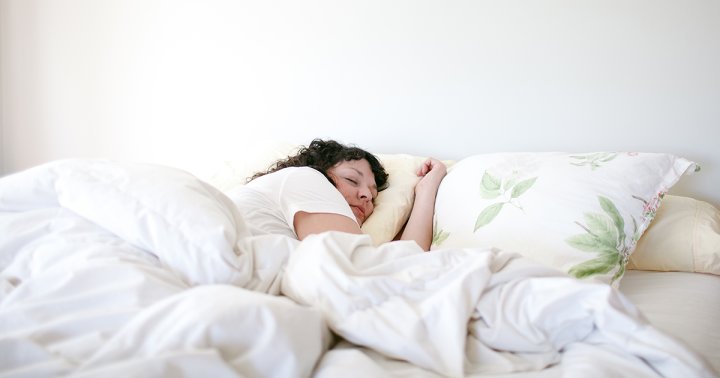This Is What Your Brain Actually Does While You Sleep, According To Research
Until now, we haven't fully understood what really happens in the brain while we sleep.

We know sleep is essential for feeling energized, keeping our immune system strong, and helping our bodies function optimally. But we still don't fully understand what actually happens in the brain while we sleep. In a new study published in the journal Nature Communications, researchers have come one step closer to illuminating the sleeping brain. Here's what they found.
Looking at the brain on sleep:
It's long been suspected that the brain consolidates memories while we sleep, but no one really knew how. So, researchers from the University of Geneva in Switzerland used functional magnetic resonance imaging (fMRI) and electroencephalography (EEG) to find out.
Participants had brain imaging done while they played two games that would light up different regions in the brain (one was a maze and the other was a face-recognition game). The games were rigged without participants' knowledge, so they could only win one of the games. By only winning one of the games, the researchers wanted to see how the "reward" of winning would change brain activity.
After the games, the participants then slept in the MRI machine for the length of a sleep cycle, where their brain activity was recorded further.
Based on their findings, it would appear the suspected memory consolidation researchers were looking for occurs in deep sleep. And part of that is figuring out which memories are worth saving, based on rewards.
In deep sleep, the hippocampus replays the day's memories, sending them to the cerebral cortex, reinforcing those neural pathways. And the brain took much more interest in the game participants won than the one they lost.
As lead author Virginie Sterpenich explains in a news release, while the volunteers slept, they "started to 'think' about both games again, and then almost exclusively about the game they won when they went into deep sleep."
As a follow-up, the participants had to recognize faces from one game, as well as get out of the maze from the other. Unsurprisingly, the more their brain imaging while sleeping showed memory consolidation, the better they performed on this follow-up task—meaning the "rewarding" memories that the brain stored were easier to recall.
This study didn't just consider brain activity while we sleep, but further, how memory consolidation can influence our emotions. Of course, there's still more research to be done to understand the mechanisms of the brain, particularly while we sleep, but this new insight may very well change how we think about sleep and memories. One thing is for sure though: if you want to remember your day, you'll definitely want to get a good night's sleep.

 AbJimroe
AbJimroe 































